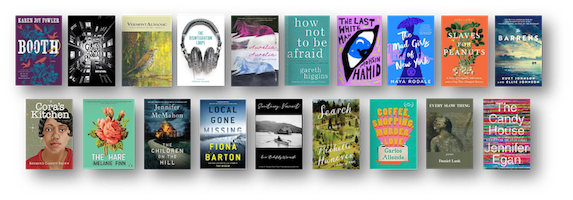
A writing podcast for writers and curious readers, featuring interviews with authors, poets, agents and editors. Twice chosen as one of Writer’s Digest Magazine’s 101 Best Website for Writers. Vermont-grown.
A writing podcast for writers and curious readers, featuring interviews with authors, poets, agents and editors. Twice chosen as one of Writer’s Digest Magazine’s 101 Best Website for Writers. Vermont-grown.
Episodes
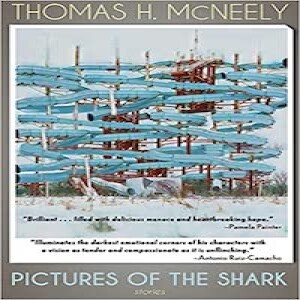
Wednesday Nov 09, 2022
Thomas H. McNeely - 11/7/22
Wednesday Nov 09, 2022
Wednesday Nov 09, 2022
Author Thomas H. McNeely, whose new collection is Pictures of the Shark: Stories (Texas Review Press).
This week’s Write the Book Prompt was generously suggested by my guest, Thomas H. McNeely, and it is drawn from our conversation. We talked about the objects that writers bring into stories, and the power that objects can hold. This week, consider doing one of two things as you work. First, write about objects that you remember from a certain period of your life. What did they mean to you at the time? Do you still have them? If not, what happened to them–do you know, or did they just disappear? What do they mean to you now? How might you use one of the important objects from your past in a story? Second, consider how you might use objects to help characters - as Thomas put it in our interview - reflect off of something. Allow that focus on an object to help them to express what they themselves probably could not express otherwise. For example, Buddy’s mother’s reaction to Richard Nixon. And Buddy’s own focus on a yellow leaf on black asphalt while he’s speaking with his father, an inconsistent and often duplicitous presence in his life.
Good luck with your work in the coming week, and tune in next week for another prompt or suggestion.
Music Credit: Aaron Shapiro
753
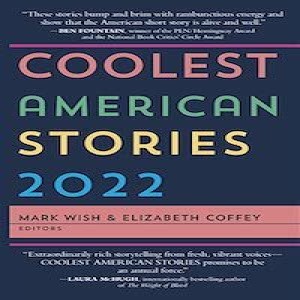
Monday Apr 11, 2022
Coolest American Stories 2022 - 4/11/22
Monday Apr 11, 2022
Monday Apr 11, 2022
Mark Wish and Elizabeth Coffey, editors of a new anthology: Coolest American Stories 2022 (Coolest Stories Press). This year marked the inaugural publication of the book, which will come out each January.
This week’s Write the Book Prompt is actually a publishing prompt (because we all know how hard it is to send out work once we've written it). Polish up your coolest, most twisty-turny story, make a list of 15 publications you think might make a good match for that story, and send it to three at a time until someone acknowledges your cool with an acceptance. After which, being a good person, you will let the others know you’ve found a home for your cool story. OR submit it to Coolest American Short Stories 2023; hey, you never know!
Good luck with your work in the coming week, and tune in next week for another prompt or suggestion.
Music Credit: Aaron Shapiro
725
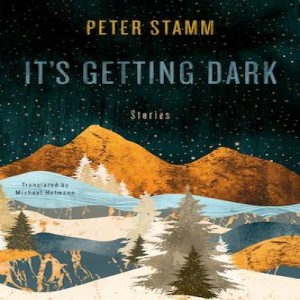
Tuesday Dec 07, 2021
Peter Stamm - 12/6/21
Tuesday Dec 07, 2021
Tuesday Dec 07, 2021
A new interview with Swiss Author Peter Stamm, whose latest story collection is It's Getting Dark (Other Press).
Peter Stamm generously suggested a Write the Book Prompt for today’s show. Go to the cemetery and see what the stones tell you about the people who are buried there. You’ll learn from the stones themselves, but also from their names and dates, from details occasionally listed on the stones, from any flowers left at the graveside. You’ll be surprised by how much you might learn about those who went before us.
Good luck with your work in the coming week, and tune in next week for another prompt or suggestion.
Music Credit: Aaron Shapiro
708
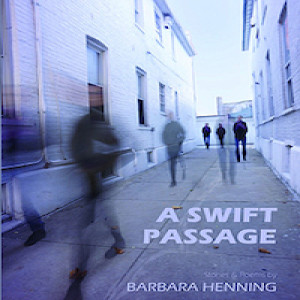
Tuesday Aug 10, 2021
Barbara Henning - Archive Interview (8/2/21)
Tuesday Aug 10, 2021
Tuesday Aug 10, 2021
Interview from the archives with poet and prose writer Barbara Henning, regarding her book A Swift Passage (Quale Press).
I have family visiting this week - lots of loved ones filling our two guest rooms, and sleeping on the floor in the finished basement, and in one case staying in the dining room. It’s a lot of fun, and a bit of a clown car. Today’s Write the Book Prompt is to imagine a house full of visitors. What might look like in your case? Where will everyone sleep? How do they all get along? What do you feed them? Do any old rivalries resurface? Old flames? Does anything happen to create a moment of excitement or adventure? How would you establish the characteristics of each person to turn these visitors into interesting characters in a work of prose or poetry?
Good luck with your work in the coming week, and tune in next week for another prompt or suggestion.
Music Credit: Aaron Shapiro
689
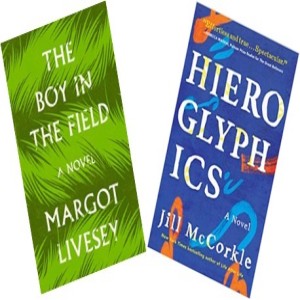
Wednesday Jan 13, 2021
Wednesday Jan 13, 2021
A conversation on plotting the so-called (one of our discussion points) literary novel. Margot Livesey's new novel is A Boy in the Field (Harper) and Jill McCorkle's latest is Hieroglyphics (Algonquin).
This week we have four Write the Book Prompts, thanks to the generosity of my guests. You’ve heard Jill’s prompts. The two exercises she suggested for writers who aren’t sure what comes next for their plot was so great, I’m using them here as well. Jill’s teacher Max Steele originally suggested these first two exercises to her:
- First, write a 1000-word sentence. In one sitting, spend the time to write out that four-page, double-spaced sentence. This will “clean out the attic,” as Jill puts it.
- Another exercise is to complete the sentence “I wish.” Later, and hopefully without actively thinking of how these sentences might link or thematically relate, write out an early memory. After you’ve written about these two ideas, see if your wish and memory connect.
- Margot suggests writing a scene that begins with the question, “Where were you last night?”
- A second prompt Margot likes to share with her students is to take a scene that you’ve already written, and rewrite it from the point of view of another character. This doesn’t mean that you should change from first person to third person, but from, say, Milicent to Larry.
Good luck with your work in the coming week, and tune in next week for another prompt or suggestion.
Music Credit: Aaron Shapiro
659

Tuesday Jan 07, 2020
Benjamin Percy - Interview #598 (1/6/20)
Tuesday Jan 07, 2020
Tuesday Jan 07, 2020
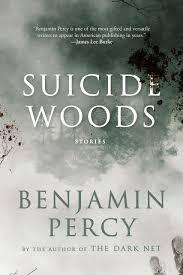
Author Benjamin Percy, whose new story collection is Suicide Woods (Graywolf).
This week’s Write the Book Prompt is to consider the blueprint exercise that Benjamin Percy mentioned assigning to his students so that they might better understand structure. Choose a favorite story and read it many times, enough that you know it inside and out. Then read it again, taking notes. Try to identify the beats of the story: the way, for example, that setting might relay theme, or dialogue might inform character weakness. After you make meticulous notes on your discoveries, write a story that tries to follow this same blueprint but bears no resemblance to the original. Perhaps then write an explanation about what you did, so that you can return to it and continue to study and understand the outcome as you write more stories. Most importantly: write more stories.
Good luck with your work in the coming week, and tune in next week for another prompt or suggestion.
Music Credit: Aaron Shapiro

Tuesday Nov 06, 2018
J.M. Holmes - Interview #535 (10/29/18)
Tuesday Nov 06, 2018
Tuesday Nov 06, 2018
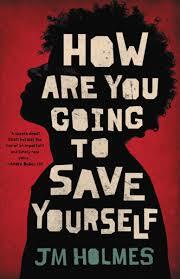
Award-Winning Author J.M. Holmes, whose debut story collection is How Are You Going to Save Yourself (Little Brown).
This week I'll offer two Write the Book Prompts, both of which were generously offered by J.M. Holmes. They are based on exercises by the author Bonni Goldberg, in her book, Room to Write, which Jeff (Holmes) recommends.
First, an exercise for writing place: choose three different songs from different musical genres and play each, taking 5-7 mins to write a scene where this music is taking place in the background. Second, for fleshing out character: write about what the person's room looks like; what does s(he) have in the closet?
Good luck with your work in the coming week, and please listen next week for another prompt or suggestion.
Music Credit: Aaron Shapiro

Wednesday Sep 26, 2018
Megan Mayhew Bergman - Archive Interview #528 (9/24/18)
Wednesday Sep 26, 2018
Wednesday Sep 26, 2018
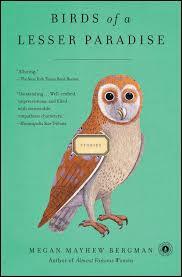
From the archives, an interview with Vermont Author Megan Mayhew Bergman. We discussed her first story collection, Birds of a Lesser Paradise (Scribner). She has subsequently published a second: Almost Famous Women.
This week’s Write the Book Prompt is to find a moment that you feel is lacking in your poetry or prose, and infuse it with at least two sensory elements--visual details or details of touch, taste, sound, or smell, to try to enliven that moment in your work. Then find another point in that same piece where you can somehow echo the sensory element that you added. For example, if you first added the taste of salmon, and this is something vital to your story, perhaps later a chair can be not just orange or pink, but salmon-colored. Don’t hit your reader over the head with something, but try to find ways to echo and repeat (important) images and ideas.
Good luck with your work in the coming week, and please listen next week for another prompt or suggestion.
Music Credit: Aaron Shapiro

Tuesday Mar 20, 2018
Yang Huang - Interview #501 (3/19/18)
Tuesday Mar 20, 2018
Tuesday Mar 20, 2018
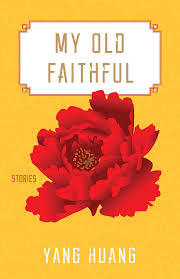
American novelist and short story writer Yang Huang. Her new novel in stories is My Old Faithful, winner of the Juniper Prize for Fiction (University of Massachusetts Press).
This week’s Write the Book Prompt was generously suggested by my guest, Yang Huang. Alter the rhythm of your writing to jog your creative mind. First, work on a problematic scene by focusing closely on the language, painstakingly going over every word choice, until you make it work or realize this needs to be cut.
After a short break, return to the desk and write as fast as you can, hardly reading what you wrote. Silence the inner critic for the time being, and set your mind free. Write for an hour, until you slow down, or you want to read over the passage.
Sleep on it. Edit the passage next day and throw away any material you cannot use. Analyze the movement in your narrative. What have you discovered about the story and characters?
Good luck with your work in the coming week, and please listen next week for another prompt or suggestion.
Music by Aaron Shapiro

Sunday Mar 18, 2018
Michael Andreasen - Interview #500 (!) (3/12/18)
Sunday Mar 18, 2018
Sunday Mar 18, 2018
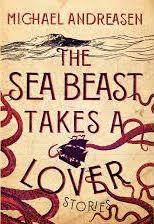
Prize-Winning Author Michael Andreasen, whose new story collection is The Sea Beast Takes a Lover (Dutton).
This week’s Write the Book Prompt was generously suggested by my guest, Michael Andreasen. Try to find an oblique angle - an odd vector of approach. Sometimes this is as simple as not starting in the place where you have the impulse to start. So if your charaters are in a room, perhaps begin in the other corner of that room. Describe the air coming in the vents, or something happening outside the window. Or maybe a sink in a nearby bathroom is making a noise. Move the focus someplace else. We have such an urge to get to the ONE thing we want to talk about, and talking about only that thing can become boring. A dripping faucet, or an unattended child spotted through a window, about to wander into the street, can ramp up the tension.
Good luck with your work in the coming week, and please listen next week for another prompt or suggestion.
Music by Aaron Shapiro

Monday Feb 26, 2018
Shelagh Reads a Story by Howard Frank Mosher - Show #497 (2/19/18)
Monday Feb 26, 2018
Monday Feb 26, 2018
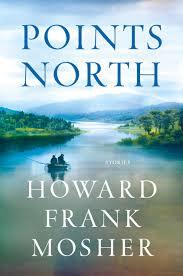
Upon his passing in 2017, Howard Frank Mosher was recognized as one of America's most acclaimed writers. He finished his final book, Points North, just weeks before his death. On today's show, in celebration of Howard Frank Mosher, and with the permission of his publisher, St. Martin's Press, I'll read one of the stories from this last collection, "Where is Don Quijote?"
This week’s Write the Book Prompt, drawing from the last sentence of Howard Frank Mosher’s story, “Where is Don Quixote?” is to write about "the one thing left in this world that you are certain of."
Good luck with your work in the coming week, and please listen next week for another prompt or suggestion.
Music Credit: Aaron Shapiro
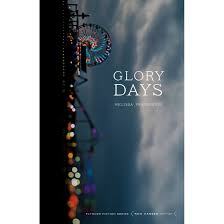
Tuesday Jan 23, 2018
Melissa Fraterrigo - Interview #492 (1/22/18)
Tuesday Jan 23, 2018
Tuesday Jan 23, 2018
Author Melissa Fraterrigo, whose new novel is Glory Days (Univ. of Nebraska Press).
This week’s Write the Book Prompt was generously offered by Melissa Fraterrigo. Take out a story, poem or novel by a writer you admire and look at one page. Isolate words that are evocative or “pop” for you. List them. Then use these words to write a sentence that feels like an opening—and write your own paragraph or scene and insert it into this place. Feel free to continue adding words from your list to your scene. The objective is to use language in a striking way and let it prompt you to use vocabulary different from your own.
Good luck with your work in the coming week, and please listen next week for another prompt or suggestion.
Music Credit: Aaron Shapiro
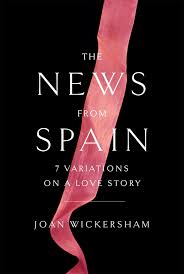
Wednesday Oct 04, 2017
Joan Wickersham - Archive Interview #476 (10/2/17)
Wednesday Oct 04, 2017
Wednesday Oct 04, 2017
Award-winning author Joan Wickersham, whose memoir The Suicide Index, was a finalist for the National Book Award. We discussed her story collection, The News From Spain (Vintage Contemporaries).
I love the way that Joan Wickersham was able to write seven stories that vary thematically but are all titled The News From Spain. Can you think of another context for this title? That’s this week’s Write the Book Prompt. Consider ‘The News from Spain’ as a concept, and write. If you haven’t read her book, and so don’t know what contexts to eliminate, try that much harder to think of applications that might seem a little wacky or outside the normal frame. Or maybe go read her book!
Good luck with your work in the coming week, and please listen next week for another prompt or suggestion.
Music Credit: Aaron Shapiro

Monday Nov 21, 2016
Megan Mayhew Bergman - Archive Interview #426 (11/14/16)
Monday Nov 21, 2016
Monday Nov 21, 2016
Interview from the archives with Vermont author Megan Mayhew Bergman. We discussed Birds of a Lesser Paradise, published by Simon and Schuster. Since this interview, Megan has published another story collection: Almost Famous Women.
Today's Write The Book Prompt is to write about the way light is coming through a nearby window.
Good luck with this prompt, and please listen next week for another!
Music credits: 1) "Dreaming 1″ - John Fink; 2) "Filter" - Dorset Greens (a Vermont band featuring several former South Burlington High School students).
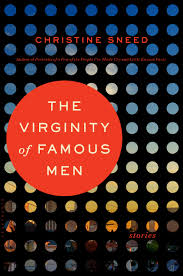
Friday Sep 16, 2016
Christine Sneed - Interview #417 (9/12/16)
Friday Sep 16, 2016
Friday Sep 16, 2016
A new interview with Christine Sneed, whose new story collection is The Virginity of Famous Men (Bloomsbury USA), just out this week.
This week’s Write the Book Prompt comes from our generous guest, Christine Sneed. Choose one of the following characters and write ten interview questions for him/her:
-
Someone who works on the housekeeping staff in a Las Vegas hotel.
-
Someone who owns 30 pairs of blue jeans.
-
Someone who runs a tow truck.
-
Someone who wants a famous face.
Now answer those ten questions in the voice of the character.
Good luck with this prompt, and please listen next week for another!
Music credits: 1) "Dreaming 1″ - John Fink; 2) "Filter" - Dorset Greens (a Vermont band featuring several former South Burlington High School students).

Monday Jan 11, 2016
Joan Leegant - Archive Interview #381 (1/4/16)
Monday Jan 11, 2016
Monday Jan 11, 2016
2011 interview with Joan Leegant, author of the story collection, An Hour in Paradise and the novel that we discuss in the interview, Wherever You Go, both published by W.W. Norton & Co.
Good luck with this exercise and please listen next week for another.
Music credits: 1) “Dreaming 1″ - John Fink; 2) “Filter” - Dorset Greens (a Vermont band featuring several former South Burlington High School students).

Monday Jan 11, 2016
Steve Almond - Archive Interview #380 (12/28/15)
Monday Jan 11, 2016
Monday Jan 11, 2016
2011 Interview with Steve Almond. We discussed his then-new book, God Bless America. He subsequently published the popular and controversial book Against Football: One Fan’s Reluctant Manifesto.
This week's Write the Book Prompt is to write about someone having to give up something they love.
Good luck with this exercise and please listen next week for another.
Music credits: 1) “Dreaming 1″ - John Fink; 2) “Filter” - Dorset Greens (a Vermont band featuring several former South Burlington High School students).
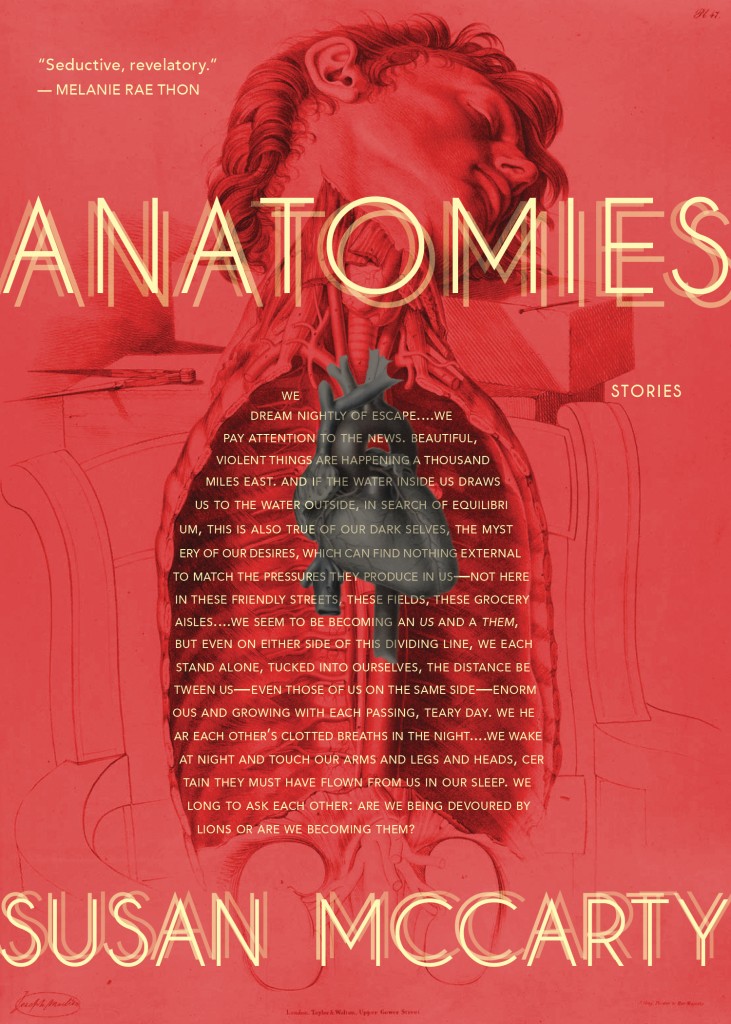
Wednesday Sep 09, 2015
Susan McCarty - Interview #364 (9/7/15)
Wednesday Sep 09, 2015
Wednesday Sep 09, 2015
Author Susan McCarty, whose collection, Anatomies (Aforementioned Productions), debuted at #6 on the Small Press Distribution fiction bestseller list.
This week’s Write The Book Prompt was suggested by my guest, Susan McCarty, whose inspiration for the story "Anatomies" came from the autobiography, Berlin Childhood around 1900 by Walter Benjamin. In it, Benjamin maps his life onto the places and spaces of his youth in Berlin. For instance, he writes about the hallway where the family telephone--which he describes as "an outcast," and "my twin brother"--was hung. He writes about the Tiergarten, a park in Berlin where he first experienced romantic love. Susan suggests that, as a prompt this week, you think about your own places and spaces and map some memories onto them, however small or insignificant-seeming the place, space, memory, or emotion. Limit yourself to 600 words for each memory/place. The point here is to make an active setting for your story, and to notice the way in which setting and plot intertwine to make each other. Susan also shared a link to Dorothy Allison’s wonderful essay, “Place,” in which, she talks about how place is not a backdrop for action, but an integral part of it. For further inspiration, Susan recommends checking out the great website Mapping Salt Lake City, curated by the poet and essayist Paisley Rekdal.
Good luck with this prompt, and please listen next week for another.

Tuesday Apr 07, 2015
Gary Lee Miller - Interview #342 (4/5/15)
Tuesday Apr 07, 2015
Tuesday Apr 07, 2015
Vermont author Gary Lee Miller, whose collection of stories, Museum of the Americas, was published by Fomite Press in July 2014.
- Here's exactly what happened.
- She was just a block from her house when she found the blue envelope on the sidewalk.
- In the beginning, all I wanted was a normal life.
Gary also shared a prompt called the Neverending Sentence, which he and his friend use in writing workshops they teach for kids. It reminds me a bit of the game of telephone. You begin by writing a simple sentence on a page, pass the sheet to another person, and ask that person to change one word or phrase. It goes from there. Gary's example is below. As you can see, it might get a little weird. But that's part of the fun. And it definitely gets more interesting!
- On a Tuesday morning, Gary Miller walked to town to buy eggs.
- On a Tuesday morning, Charmagne Miller walked to town to buy eggs.
- On a raggedy Tuesday morning, Charmagne Miller walked to town to buy eggs.
- On a raggedy Tuesday morning, Charmagne Miller walked to Carter’s Corner to buy eggs.
- On a raggedy Tuesday morning, Charmagne Adelphi walked to Carter’s Corner to buy eggs.
- On a raggedy Tuesday morning, Charmagne Adelphi walked to Carter’s Corner to steal eggs.
- On a raggedy Tuesday morning, Charmagne Adelphi walked to Carter’s Corner to steal somebody’s car.
- On a raggedy Tuesday morning, Charmagne Adelphi walked to Carter’s Corner to steal Henry Beefer’s car.
- On a raggedy Tuesday morning, Charmagne Adelphi walked to Carter’s Corner to steal Henry Beefer’s golden retriever.
- On a raggedy Tuesday morning, Charmagne Adelphi walked to Carter’s Corner to steal Henry Beefer’s deaf golden retriever.
- On a raggedy Tuesday morning, Charmagne Adelphi stumbled to Carter’s Corner to steal Henry Beefer’s deaf golden retriever.
- On a raggedy Tuesday morning, Charmagne Adelphi stumbled, half exhausted and violently ill, to Carter’s Corner to steal Henry Beefer’s deaf golden retriever.
- On a raggedy Tuesday morning, Governor Peter S. Shumlin stumbled, half exhausted and violently ill, to Carter’s Corner to steal Henry Beefer’s deaf golden retriever.
- On the Tuesday before the hurricane, Governor Peter S. Shumlin stumbled, half exhausted and violently ill, to Carter’s Corner to steal Henry Beefer’s deaf golden retriever.
- On the Tuesday before the hurricane, Governor Peter S. Shumlin stumbled, half exhausted and violently ill, to Carter’s Corner to vaccinate Henry Beefer’s deaf golden retriever.
- On the Tuesday before the hurricane, Governor Shumlin stumbled, half exhausted and violently ill, to Carter’s Corner to feed Henry Beefer’s deaf golden retriever.
- On the Tuesday before the hurricane, Governor Peter S. Shumlin stumbled, half exhausted and violently ill, to Carter’s Corner to shoot Henry Beefer’s deaf golden retriever.
- On the Tuesday before Hurricane Irene wiped out half of Vermont, Governor Peter S. Shumlin stumbled, half exhausted and violently ill, to Carter’s Corner to shoot Henry Beefer’s deaf golden retriever.
- On the Tuesday before Hurricane Irene wiped out half of Vermont, Governor Peter S. Shumlin’s half brother Luke Tweedly stumbled, half exhausted and violently ill, to Carter’s Corner to shoot Henry Beefer’s deaf golden retriever.
- On the Tuesday before Hurricane Irene wiped out half of Vermont, Governor Peter S. Shumlin’s half brother Luke Tweedly stumbled, half exhausted and violently ill, to Carter’s Corner to shoot Henry Beefer’s deaf golden retriever in the ass.
- On the Tuesday before Hurricane Irene wiped out half of Vermont, Governor Peter S. Shumlin’s half brother Luke Tweedly stumbled, half exhausted and violently ill, to Carter’s Corner to shoot Henry Beefer’s ex wife Melodica in the ass.
- On the Tuesday before Hurricane Irene wiped out half of Vermont, Governor Peter S. Shumlin’s half brother Luke Tweedly stumbled, half conscious and furious as a rabid hamster, to Carter’s Corner to shoot Henry Beefer’s ex wife Melodica in the ass.
- On the Tuesday before Hurricane Irene wiped out half of Vermont, Governor Peter S. Shumlin’s half brother Luke Tweedly stumbled, half conscious and furious as a rabid hamster, to Carter’s Corner to shoot Henry Beefer’s ex wife Melodica, who had betrayed him more than once, in the ass.
- On the Tuesday before Hurricane Irene wiped out half of Vermont, Governor Peter S. Shumlin’s half brother Luke Tweedly stumbled, half conscious and completely furious, to the Little Bub Daycare Center to shoot Henry Beefer’s ex wife Melodica, who had betrayed him more than once, in the ass.
- On the Tuesday before Hurricane Irene wiped out half of Vermont, Governor Peter S. Shumlin’s half brother Luke Tweedly stumbled, half conscious and completely furious, to the Little Bub Daycare Center to shoot Henry Beefer’s ex wife Melodica, who had betrayed him more than once, in the ass with Cupid’s arrow of love.
Good luck with these exercises, and listen next week for another.
Music credits: 1) “Dreaming 1″ - John Fink; 2) “Filter” - Dorset Greens (a Vermont band featuring several former South Burlington High School students.

Thursday Jan 08, 2015
William Lychack - Archive Interview #327 (12/29/14)
Thursday Jan 08, 2015
Thursday Jan 08, 2015
An interview from the archives with Vermont author of fiction and poetry, William Lychack, whose books are The Wasp Eater and The Architect of Flowers.

Saturday Dec 27, 2014
Angela Palm and Malisa Garlieb - #326 (12/22/14)
Saturday Dec 27, 2014
Saturday Dec 27, 2014
Two interviews this week, with Vermont author and editor Angela Palm, whose new collection is Please Do Not Remove, and Vermont poet Malisa Garlieb, whose new book of poetry is Handing Out Apples in Eden. Both of these collections were published this fall by Wind Ridge Books of Vermont.
Today I have two Write The Book Prompts to offer, thanks to the generous suggestions of my guests, Angela Palm and Malisa Garlieb.
Malisa’s is to write a personal poem using a mathematical concept or equation as the primary metaphor, as she did in her poem, "Long Division."
Angi’s is this: select an image of a used library check-out card. Use any combination of the card's features as the source of inspiration for generating a new work of prose or poetry. Perhaps you'll be inspired by a particular patron's signature, a date stamp, or the book's subject matter or author. Perhaps you'll be struck by the card's appearance or the accumulation or use or non-use. Let the image transport you to another time or place, and draft some ideas or a follow a single idea for 10-15 minutes. In revision and shaping of the draft, study the card again and allow yourself to do a little research that might further develop your initial impulses into a story or essay. You may quickly find yourself pages deep in a story you never knew you'd want to write. Angi shared these images of library cards for your prompt this week. (Open individually in new tabs for a better look at each):





Good luck with these exercises and please listen next week for another!

Friday Dec 05, 2014
J. Robert Lennon - Interview #323 (12/1/14)
Friday Dec 05, 2014
Friday Dec 05, 2014
J. Robert Lennon, whose second story collection, See You in Paradise, is just out from Graywolf Press.

Tuesday Sep 30, 2014
Bill Schubart - Archive Interview #311 (9/8/14)
Tuesday Sep 30, 2014
Tuesday Sep 30, 2014
2011 Interview with Vermont short story writer, Public Radio Commentator and businessman Bill Schubart about his collection, Fat People.
This week's Write the Book Prompt is to write honestly about what you perceive to be a physical imperfection of your own, and to find compassion in your description of that trait.
Good luck with this prompt and please listen next week for another.
Music credits: 1) “Dreaming 1″ - John Fink; 2) “Filter” - Dorset Greens (a Vermont band featuring several South Burlington High School students).

Tuesday Jun 24, 2014
Philip Graham - Interview #299 (6/23/14)
Tuesday Jun 24, 2014
Tuesday Jun 24, 2014
Write the Book's 300th (!) episode features an interview with Philip Graham, author of two story collections, The Art of the Knock and Interior Design; a novel, How to Read an Unwritten Language; and The Moon, Come to Earth, an expanded version of his series of McSweeney's dispatches from Lisbon. He is also the co-author (with his wife, anthropologist Alma Gottlieb) of two memoirs of Africa, Parallel Worlds (winner of the Victor Turner Prize), and Braided Worlds. Dzanc Books will reprint The Art of the Knock, Interior Design, and How to Read an Unwritten Language as ebooks this summer.
This week’s Write the Book Prompt is inspired by the interview you heard today with the author Philip Graham. We spoke about the appearance of objects in written work. As Philip mentioned, his 1979 short story, “Light Bulbs,” chronicled how a couple coping with the “empty nest” grew to form relationships with the light bulbs in their home, almost as a substitute for their absent children. This week, as you work, consider the objects that show up in your work. In particular, pay attention to those objects that already exist there. Try to understand what they might be doing for your story, and how your appreciation of their existence might deepen what you’re writing.
Good luck with this prompt and please listen next week for another.
Music credits: 1) “Dreaming 1″ - John Fink; 2) “Filter” - Dorset Greens (a Vermont band featuring several former South Burlington High School students, now alums).

Monday Jan 27, 2014
James Tabor - Archive Interview #280 (1/27/14)
Monday Jan 27, 2014
Monday Jan 27, 2014
This week’s Write The Book prompt is to write about an adventure you've had as an adult.
Good luck with this exercise and please listen next week for another.
Music credits: 1) “Dreaming 1″ - John Fink; 2) “Filter” - Dorset Greens (a Vermont band featuring several South Burlington High School students.

Tuesday Sep 03, 2013
David Jauss - Interview #259 (9/2/13)
Tuesday Sep 03, 2013
Tuesday Sep 03, 2013
David Jauss, award-winning author of Glossolalia: New and Selected Stories, published by Press 53.
Today’s Write The Book Prompt was suggested by my guest, David Jauss. It’s an exercise he has used in his introductory writing classes, because this helps people realize they have a creative ability that they otherwise might not know that they have. He starts by offering students a situation to work from:
A man is standing at a bus stop. The bus is due in about five minutes. He’s alone. Then a woman shows up. She turns out to be his ex-wife. They haven’t seen each other in several years.David says that if he just were to leave it at that, people would immediately start inventing their own stories, and playing things out. What he asks is that students write dialogue only. He wants five exchanges between the two characters. Each side of an exchange can be more than one sentence, but only five exchanges, and no descriptions, no setting - only dialogue. First the man says something, then the woman. Then the man, and the woman. Five times total. (David jokes that, as this is fiction, you should give the man the last word.)
Another layer to the prompt is this: do not plan out what the characters will say to one another. David’s students have to wait until he shares a word with them, for each half of each exchange. He chooses a book at random, opens to any page, points his finger to the page, and says the word he finds there. For example, he might hit the word “funnel.” So the man’s half of the first exchange must include the word funnel. When the woman responds, she will need to use the second word that David finds when he opens to another random page and tells his students the word he finds there. So you’ll find ten words, one at a time as you go, to incorporate into these five exchanges.
As you write using today’s prompt, either enlist the help of a partner, who can find random words for you to use in your five exchanges, or open a book of your own and choose as you go, finding words on your own. But don’t plan the five exchanges ahead of time.
Once you have the five exchanges, THEN ask yourself what your characters look like, and what are the details of the setting that you held back from writing initially. David says that people find really interesting ways to put these words in the dialogue, whereas if they had known the words ahead of time, they’d naturally start to plan it all out. Also, as you write the dialogue, you will likely find out about the surroundings, and the details of what your characters look like and such, without realizing you’ve done it, and without “planning it.” I’m guessing, too, that you’d have never used a word such as “funnel” in your dialogue, which means that what you come up with might well be more interesting and take you to a different place than you would have expected.
Good luck with these exercises and please listen next week for another.
Music credits: 1) “Dreaming 1″ - John Fink; 2) “Filter” - Dorset Greens (a Vermont band featuring several South Burlington High School students.

Tuesday Aug 13, 2013
Burlington Area Writers' Resources - Show #256 (8/12/13)
Tuesday Aug 13, 2013
Tuesday Aug 13, 2013
Interviews highlighting three local groups that are making the Burlington area writing community much richer: The Burlington Writers' Workshop (Peter Biello), The Renegade Writers' Collective (Angela Palm and Jessica Hendry Nelson), and The Writers' Barn (Lin Stone and Daniel Lusk).
Today I have two Write The Book Prompts. The first is to write about two interactions between lifelong friends: the first time they meet, and the last time they meet. Limit each scene to a page, but try to intimate a whole friendship into those two pages, letting us know who these people are, how they eventually influence each other, how important they become in each other's lives.
Today's second prompt was suggested by my guest, the poet Daniel Lusk. It's a prompt he used recently in the poetry group at the Writers Barn: Write a poem with a red dress in it.
Good luck with these exercises and please listen next week for another.
Music credits: 1) “Dreaming 1″ - John Fink; 2) “Filter” - Dorset Greens (a Vermont band featuring several South Burlington High School students.

Monday Jul 08, 2013
Abby Frucht - Interview #251 (7/8/13)
Monday Jul 08, 2013
Monday Jul 08, 2013
2013 Interview with the writer Abby Frucht, whose collection of stories, The Bell at the End of a Rope, is new from Narrative Library.
Today's Write The Book Prompt was mentioned by my guest, Abby Frucht, during our interview. You may recall that when we spoke, she said that she will ask new students to read the opening line or lines of a story, and then to use those lines to "project the objects, events, circumstances, characters, techniques, perspectives ... structural inclinations, anything that will take place over the course of the story." So today's prompt is to do this. Read the opening lines of a story - not one of your own, of course - and make a list of these story elements for which you might see the opening lines laying the groundwork. Then put down your list of gleaned ideas, read the full story, and see how the piece of fiction emerges from those early sentences. Don't look at this as a test of your ability to predict the story, but to understand how that author uses the early sentences to lead the reader into the story. In our interview, Abby said that the first lines have both the responsibility and the privilege of that introduction -- they lay down the clues about how the rest of the story might be drawn.
Good luck with this exercise and please listen next week for another.
Music credits: 1) “Dreaming 1″ - John Fink; 2) “Filter” - Dorset Greens (a Vermont band featuring several South Burlington High School students.

Tuesday Mar 05, 2013
Moira Crone - Interview #233 (3/4/13)
Tuesday Mar 05, 2013
Tuesday Mar 05, 2013
Short story writer and novelist Moira Crone, whose latest book is The Not Yet, published by University of New Orleans Press and one of seven on the ballot for the Philip K. Dick Award - Best Paperback Original Science Fiction Novel of the Year (winner to be announced in late March 2013). Click here to see artwork inspired by The Not Yet. Today I have several Write The Book Prompts to offer, suggested by my guest, Moira Crone. Conventional Fiction Prompts: After he stopped her from jumping ... I remember ... I will never forget ... Speculative Fiction Prompts: Since there was no more religion, he decided to ... Once the sky had smashed into smithereens, she ... She read his arm to see where he was headed ... Good luck with these exercises and please listen next week for another. Music credits: 1) "Dreaming 1″ - John Fink; 2) "Filter" - Dorset Greens (a former Vermont band featuring several South Burlington High School graduates).

Wednesday Nov 14, 2012
Joan Wickersham - Interview #218 (11/12/12)
Wednesday Nov 14, 2012
Wednesday Nov 14, 2012
Interview with National Book Award Finalist and Author of Fiction and Memoir, Joan Wickersham. Her latest book is The News From Spain, published by Knopf. This week's Write The Book Prompt was suggested by my guest, Joan Wickersham. When she teaches, she often encourages her students to read Tim O'Brien's extraordinary story, The Things They Carried, from the collection by the same name. After reading the story, which is, in fact, a long list in itself, make your own list. In fact, make a list of lists. What are some ideas for structuring a story in the form of a list? Here are a few ideas I've come up with: a grocery list, a packing list, a to-do list, a category on Craig's List! Come up with a few of your own. Then pick one of those ideas and see if you can write a story using that list form as a structural device, or just for inspiration. Good luck with this prompt and tune in next week for another. Music credits: 1) “Dreaming 1″ - John Fink; 2) “Filter” - Dorset Greens (a Vermont band featuring several former South Burlington High School students, now alums).

Wednesday Aug 08, 2012
Tana French / Carrie Mackillop - Interviews # 204 (8/6/12)
Wednesday Aug 08, 2012
Wednesday Aug 08, 2012
Two interviews this week: 1) Award-winning Irish author Tana French, whose latest Dublin Murder Squad novel is Broken Harbor, published by Viking/Penguin. 2) Local writer Carrie Mackillop, recent winner of NPR's 3-Minute Fiction Contest and owner of the Old Brick Store in Charlotte, VT. Today's Write The Book prompt was suggested by my guest, Carrie Mackillop. Write a story of 600 words in which a parent confesses something to a child. Carrie also offered an opening line, "Tess was drowning in inefficiency." You could use that in conjunction with her first prompt, or on its own as a first line, just as NPR's first line inspired Carrie to write Rainy Wedding. Good luck with this prompt, and tune in next week for another! Music credits: 1) “Dreaming 1″ - John Fink; 2) “Filter” - Dorset Greens (a Vermont band featuring several South Burlington High School students)

Tuesday Jul 17, 2012
Douglas Glover - Interview #201 (7/16/12)
Tuesday Jul 17, 2012
Tuesday Jul 17, 2012
Award-winning Canadian author Douglas Glover, on his latest book: a collection of essays on writing, Attack of the Copula Spiders, published by Biblioasis. Today's Write The Book Prompt is to write what Douglas Glover playfully calls "a but-construction." In his new book, ATTACK OF THE COPULA SPIDERS, he writes: "Imagine any simple declarative sentence, and add the word but to the end." The example Douglas offers is: "The barn was red, but..." Now keep writing. See what complexity you might be able to introduce to this sentence, or another of your own devising, simply by adding the word "but." As he explains in the book, "I wrote the word 'but' and then had to write something else; the blank space demands completeness. I had no idea what I might put in there before I wrote the words. The result is pure invention, discovery, and rather fun." Good luck with this prompt and tune in next week for another. Music credits: 1) "Dreaming 1″ - John Fink; 2) "Filter" - Dorset Greens (a Vermont band featuring several former South Burlington High School students).

Thursday Jun 07, 2012
Julia Alvarez - Interview # 195 (6/4/12)
Thursday Jun 07, 2012
Thursday Jun 07, 2012
Award-winning Vermont author Julia Alvarez, whose latest book is A WEDDING IN HAITI: THE STORY OF A FRIENDSHIP, published by Shannon Ravenel Books, an imprint of Algonquin. The televised production of this interview can be found at RETN.org Today I can offer two Write The Book Prompts, both of which were generously suggested by my guest, Julia Alvarez.The first is to write a list poem or prose passage. Julia loves making lists, and reading them. She wrote in an email, "sometimes, when I am grocery shopping, I'll find a discarded list on a shelf or on the floor, and I always pick it up and read it. Many are just a straight list of items to buy, but every once in a while, the list will include little notes or things to do. I'll start to imagine a story for the shopper who dropped the list!" She offered a number of examples of good list poems and prose passages, including Triad, by 19th century poet Adelaide Crapsey: These be three silent things: the falling snow. . .the hour before dawn. . .the mouth of one just dead Julia asks writers to remember that the items on the list need to be vivid and concrete, as sharp as little haikus, because as we read a list, we have to quickly picture each item before the next one comes on board. No brand names. None of those airbrushed abstract adjectives ("beautiful," "interesting") that are vague and generic" and don't nail down an image with a bright flash of recognition. She writes, "I love the surprises and juxtapositions that happen when you try to group, say, shapely things on a list." She sent a number of eighth graders' wonderful poems, from a workshop that she taught. Here they are: Shapely Things Waves on an ocean. . . long, high rollercoasters, mouths forming words. . . writing. . . someone walking or running with a limp. . . clouds in the open sky. . . a mind forming an idea. Tammy, 8th grade These things hardly have time: lightning in a storm, very nervous people, the rush of embarrassment, the years in a life and a never-stopping clock. These things hardly have time. Scott, 8th grade These things are extra hard: writing a poem, being original, riding up a hill in 10th gear, and taking wet socks off. James, 8th grade Slippery Things Rocks the water of a creek runs over Worms and the slime of a swamp. Catch a fish--that, too. The words of a blabber mouth. Sue, 8th grade Another writing prompt came via a book her stepdaughter Berit gave to Julia one Christmas: Six-Word Memoirs by Writers Famous & Obscure, edited by Smith Magazine, which has a whole site devoted to posts of six-word memoirs. So the second prompt would be: write your six-word memoir! Julia cautions that it can be really difficult to get an essence of who you are so briefly. Good luck with these prompts, and please listen next week for another! The commemorative event that Julia and I discussed during the interview, marking the 75th anniversary of the 1937 Haitian Massacre, takes place in October. More information about that event will be available at border of lights.org More information about Piti's band, Rise Up, Brothers, will be available soon at cafealtagracia.com

Friday May 25, 2012
Carol Anshaw - Interview # 193 (5/21/12)
Friday May 25, 2012
Friday May 25, 2012
Novelist Carol Anshaw, whose new book is Carry The One, published by Simon and Schuster. Today's Write The Book Prompt was suggested by my guest, Carol Anshaw, who uses it in her classes in the MFA in Writing program at the School of the Art Institute of Chicago. The prompt actually started from an exercise in the book What If? by Anne Bernays and Pamela Painter, although Carol uses a slightly altered version. Take an event that happened in your life between the ages of 5 and 11. Write a list comprised of everything you can remember about that incident. Then make a second list: everything you don't remember. Write a story using that second list. The exercise is particularly useful for new writers, who, afterward, might better understand the process of creating fiction. Good luck with this prompt, and please listen next week for another! Music credits: 1) "Dreaming 1″ - John Fink; 2) "Filter" - Dorset Greens (a Vermont band featuring several former South Burlington High School students).

Wednesday May 09, 2012
Megan Mayhew Bergman - Interview #191 (5/7/12)
Wednesday May 09, 2012
Wednesday May 09, 2012
Vermont short story writer Megan Mayhew Bergman, author of Birds of a Lesser Paradise, published by Simon and Schuster. Today's Write The Book Prompt was inspired by my conversation with Megan Mayhew Bergman. Twice during our conversation, she talked about slowing down the fiction narrative, to its benefit. She mentioned slowing things down poetically as you approach the end of a story. She also talked about slowing down the outcome of a suspenseful moment in a story. This week, think about how you might use this advice in a story or a scene of your own. Slow things down, perhaps when you're most tempted to speed things up, and see what happens. Good luck with this prompt, and please listen next week for another! Music credits: 1) "Dreaming 1″ - John Fink; 2) "Filter" - Dorset Greens (a Vermont band featuring several former South Burlington High School students).

Wednesday Mar 21, 2012
Creston Lea - Archive Interview #184 (3/19/12)
Wednesday Mar 21, 2012
Wednesday Mar 21, 2012
Interview from the archives with short story writer and guitar builder, Creston Lea, author of the story collection Wild Punch, published by Turtle Point Press. The last time I broadcast this interview with Creston Lea, I used his suggestion for a Write The Book Prompt, which was to eavesdrop on a conversation in a public place, and then use what you heard to write a scene with dialogue. This time, I'll recommend something slightly different, but also useful in writing dialogue. Using a digital recorder or a dictaphone, record a conversation between two people. Then transcribe the conversation exactly as it occurred. Keep all of their pauses and stutters and "ums" and repetitions. Now study a page of dialogue in a book. What might differ in the way that conversation actually sounds from the way that would best represent it on the page? What would you take out, what might you change or add? See if you can turn the conversation that you recorded into a scene that would be understandable--effortless for a reader to digest. Good luck with this prompt, and please listen next week for another! Music credits: 1) "Dreaming 1″ - John Fink; 2) "Filter" - Dorset Greens (a Vermont band featuring several former South Burlington High School students).

Tuesday Feb 28, 2012
Stewart O'Nan - Interview #181 (2/27/12)
Tuesday Feb 28, 2012
Tuesday Feb 28, 2012
Award-winning author Stewart O'Nan, whose latest novel is The Odds: A Love Story, published by Viking. This week's Write The Book Prompt was suggested by my guest, Stewart O'Nan. While you're writing, be sure to remember all five senses. Often beginning writers approach their work very cinematically, relying heavily on visuals, or occasionally something auditory. So while you work, be sure to think about texture, feel, taste, smell, as well as sights and sounds. Stewart O'Nan actually takes his hand - his five fingers - and slaps it to the top of his head to remind himself to think about this as he works. The flip side of that is, don't just include the senses because you can come up with interesting smells or tastes. Any detail that you include-any sensory reaction-has got to impinge on your characters' true desires. Otherwise, there's no need for it to be in the book. Selectivity is all, Stewart says. Good luck with this prompt, and please listen next week for another! Music credits: 1) “Dreaming 1″ - John Fink; 2) “Filter” - Dorset Greens (a Vermont band featuring several former South Burlington High School students).

Friday Feb 10, 2012
Margot Livesey - Interview #178 (2/6/12)
Friday Feb 10, 2012
Friday Feb 10, 2012
Award-winning writer Margot Livesey, author of the new novel, The Flight of Gemma Hardy, published by Harper. Today's Write The Book Prompt is to write about a character who, for some reason, assumes another identity. The character can be acting on a dare, trying to escape something or someone, or just testing him- or herself to see if s(he)can get away with it. What name will the character choose? What job will she pretend to have? Where will she say she's from? What history will he choose to give himself? How will assuming another identity affect your character's self-esteem? Will she feel excited? Guilty? Will he have to solicit help from others to make this work? Play around with a fictional life for your fictional character. Good luck with this prompt, and please listen next week for another!

Thursday Feb 02, 2012
Robin Hemley - Archive Interview #177 (1/30/12)
Thursday Feb 02, 2012
Thursday Feb 02, 2012
Robin Hemley, author of the book Do Over! “in which a 48- year-old father of three returns to kindergarten, summer camp, the prom, and other embarrassments.” Robin will have two new books out in 2012: Reply All: Stories (Break Away Books), and A Field Guide for Immersion Writing: Memoir, Journalism, and Travel, (University of Georgia Press). You can find more information about these on Robin's website. The sound quality of today's archive rebroadcast was not great. Not sure what happened, but a bit buzzy. So here I'm posting the old podcast as it originally ran in 2009, in hopes of providing better sound quality. The were minor differences in the intro and closing, most notably a new prompt, which I'm offering below. Thanks for your patience. Today's Write The Book Prompt is to organize your own Do Over. Maybe it doesn't make a lot of sense for you to redo the prom, or to re-enroll in kindergarten. But perhaps you had another experience in recent weeks or months that you wish you could do over. Go back to the store where a counter person was rude and you left feeling upset. Or make plans to see a friend to whom YOU were perhaps rude, or were not your best self in some way, and you left feeling embarrassed or frustrated or uniquely human. Revisit your old school, if it's nearby, track down one of your former teachers. Maybe you gave a reading at a local open mike venue and it went poorly; try it again. See how it goes to re-approach an imperfect experience with new enthusiasm and perspective. And then write about the two events, and what you might have taken away from this exercise. Good luck with it, and please listen next week for another!

Sunday Jan 29, 2012
Howard Frank Mosher - Archive Interview #176 (1/23/12)
Sunday Jan 29, 2012
Sunday Jan 29, 2012
Interview from the Archives with Award-Winning Vermont Writer Howard Frank Mosher, whose new book, The Great Northern Express, comes out March 6, 2012. Today's Write The Book Prompt celebrates a little-known holiday. According to the Writing Instrument Manufacturers Association, which established the event in 1977, Today is National Handwriting Day, a day devoted to promoting the utilization of pens, pencils, and writing paper. January 23rd was chosen by the association because this is the birthday of John Hancock, the first person to sign the Declaration of Independence. So the prompt today is to write long hand. Write a poem, a page, or a chapter, or simply free write for a set amount of time - but do so by putting pen to paper. Let your hand experience the activity of writing, of sweeps and loops and spirals and lines. Nathalie Goldberg, in her book, Writing Down The Bones, says that a different aspect of yourself comes out when you type. She also says that when she writes something emotional, she must write it "the first time directly with hand on paper." Handwriting, according to Goldberg, "is more connected to the movement of the heart." So this week, write something in your own handwriting. Good luck with this exercise and please listen next week for another!

Tuesday Jan 17, 2012
Castle Freeman, Jr. - Archive Interview #175 (January 16, 2012)
Tuesday Jan 17, 2012
Tuesday Jan 17, 2012
Vermont author Castle Freeman, Jr., whose latest book is Round Mountain: New and Collected Stories, published by Concord ePress and coming out soon in print from Concord Free Press.
Today's Write The Book Prompt is a visual exercise. I'm posting three photos here; choose one that inspires you, and write. I hope you have fun with it. Good luck, and please listen next week for another prompt.
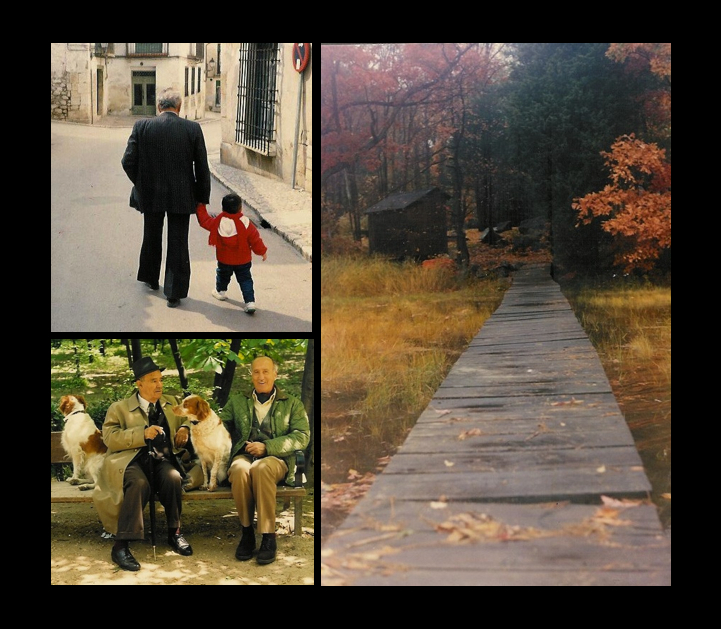 Music credits: 1) “Dreaming 1″ - John Fink; 2) “Filter” - Dorset Greens (a Vermont band featuring several former South Burlington High School students).
Music credits: 1) “Dreaming 1″ - John Fink; 2) “Filter” - Dorset Greens (a Vermont band featuring several former South Burlington High School students).

Monday Dec 26, 2011
Joan Leegant - Interview # 172 (12/19/11)
Monday Dec 26, 2011
Monday Dec 26, 2011
Joan Leegant, Award-winning Author of Stories and the Novel, Wherever You Go, published by Norton. Today I have two Write The Book Prompts to suggest, both of which were generously offered by my guest, Joan Leegant. First, write titles: maybe ten of them. Pick one, and start writing. Let the title you've come up with and chosen be the impetus that feeds what you write. Joan's second suggestion is to read someone else's book for an hour and then write ten first lines of your own. Pick one, and go from there. Reading another book first will put your mind into the language of fiction, and can help to feed the first lines you write. Good luck with these exercises and please listen next week for another. Music credits: 1) “Dreaming 1″ - John Fink; 2) “Filter” - Dorset Greens (a Vermont band featuring several former South Burlington High School students).

Tuesday Dec 06, 2011
Steve Almond - Interview #170 (12/5/11)
Tuesday Dec 06, 2011
Tuesday Dec 06, 2011
Author Steve Almond, whose third book of stories, God Bless America, has just come out from the Lookout Books (UNC Wilmington). Today's Write The Book Prompt was suggested by my guest, Steve Almond, who said in our interview that he feels the path to the truth runs through shame. Think of the most shameful moment you can recall and write about it. Set up the piece so that readers will be oriented, and then write about those five or ten seconds, or that minute, of shame. Chances are, that will be a great piece of writing. As Steve put it, "You have to be willing to disclose your own stuff, you have to be willing to put it on the line." Good luck with this exercise and please listen next week for another. Music credits: 1) “Dreaming 1″ - John Fink; 2) “Filter” - Dorset Greens (a Vermont band featuring several former South Burlington High School students).

Monday Nov 14, 2011
Christopher Noel - Archive Interview #166 (October 31, 2011)
Monday Nov 14, 2011
Monday Nov 14, 2011
Interview From the Archives with Vermont Author of Memoir, Fiction and Nonfiction, Christopher Noel, whose most recent books include Impossible Visits: The Inside Story of Interactions with Sasquatch at Habituation Sites, and A Frail House: Stories. Today's Write The Book Prompt was suggested by my guest, Chris Noel in 2009, when I first interviewed him. It's a great prompt, and fitting for Halloween, so I'm repeating it now. During the interview, Chris mentioned that writers should meditate on the monsters that move us, those mysterious creatures that fascinated and perhaps repelled us when we were small. Contemplate the monster that lived under your bed, inside your closet, or outside your window, and then free write. This is a great way to enlighten or SHOW yourself what interests and motivates you. It may well also show you something you'd forgotten or hadn't even realized about yourself. Good luck with this exercise and please listen next week for another. Music credits: 1) “Dreaming 1″ - John Fink; 2) “Filter” - Dorset Greens (a Vermont band featuring several former South Burlington High School students).

Thursday Oct 13, 2011
Diane Lefer - Archive Interview #163 (10/10/11)
Thursday Oct 13, 2011
Thursday Oct 13, 2011

Wednesday Sep 07, 2011
Priscilla Long - Interview #158 (9/5/11)
Wednesday Sep 07, 2011
Wednesday Sep 07, 2011
Priscilla Long, award-winning poet, prose writer and teacher. Seattle-based author of The Writer's Portable Mentor: A Guide to Art, Craft, and the Writing Life. For this week's Write the Book Prompt, I'll offer two exercises in writing voice from Priscilla Long's book on craft, The Writer's Portable Mentor. To practice capturing voices you know well: spend fifteen minutes writing a bitter complaint in your own most colloquial voice. A second exercise is to spend five minutes writing beyond this opening: "My father always used to say..." Many thanks to Priscilla for allowing me to suggest these exercises to you! Good luck with them, and please listen next week for another.

Tuesday May 31, 2011
Heidi Durrow - Write The Book Interview #144 (5/30/11)
Tuesday May 31, 2011
Tuesday May 31, 2011
Bestselling Novelist Heidi Durrow, Author of The Girl Who Fell From The Sky. This week's Write The Book Prompt was inspired by the work of my guest Heidi Durrow. In the interview, she spoke about the difference between writing short fiction, which tends to find endings and closure, and longer fiction, which needs to open up possibilities that lead into the next part of the novel. This week, write about a character who witnesses something extraordinary. First, write a 500-word story about the situation, in which you offer closure. Then write 500 words that might belong within a longer work of fiction-a chapter that asks questions and opens up the situation for further exploration. Good luck with this exercise and please listen next week for another.

Wednesday May 18, 2011
William Lychack - Write The Book Interview #142 (5/16/11)
Wednesday May 18, 2011
Wednesday May 18, 2011
Vermont author of fiction and poetry, William Lychack, whose latest book of short stories is The Architect of Flowers. This week's Write The Book Prompt was suggested by my guest William Lychack. He calls it AN EXPERIMENT IN SYNTAX: THE NEGATIVE INVERSION. Choose a piece of writing that you particularly like or need to think about in some way. Rewrite the piece by copying down the opposite of each word in the excerpt (except, perhaps, for "little words" like articles and prepositions.) Since most words don't have exact opposites, the possibilities are endless, and that's the point. Here's an example that William Lychack provided, inspired by an excerpt from Emerson. Unfortunately, I don't believe I have the legal right to write out the Emerson excerpt here, on my podcast site. You can probably find it online, though. It begins "I dreamed that I floated at will in the great ether," and ends, "I ate the world." [Emerson] Here is William Lychack's Negative Inversion of the quote:
You awoke on the tiny tip of a pin, attached against your will, blind to all but that pinpoint of fire, a vast emptiness beneath these nightmares of a boy. Then a demon took you by the needle and carried you down and said, "Open your mouth." And you opened like a dark void. [Lychack]
Your poem or letter or postcard probably won't make much sense at first, but continue writing your negative inversion until you have your own draft. Work quickly on this first draft, letting your unconscious decide the antonyms. Now put the original away and see what you can make of your draft. Look for a sense of place, character, or subject to develop; cut out what you can't make work; alter details as much as you wish. Good luck with this exercise and please listen next week for another. Music credits: 1) “Dreaming 1″ - John Fink; 2) “Filter” - Dorset Greens (a Vermont band featuring several South Burlington High School students)
Monday May 09, 2011
Sydney Lea - Archive Interview #141 (5/9/11)
Monday May 09, 2011
Monday May 09, 2011
Interview with author of poetry and prose Sydney Lea. Hosted by Shelagh C. Shapiro, Write The Book airs on WOMM-LP 105.9 FM “The Radiator,” in Burlington, Vermont, every Saturday morning at 9:00 a.m. - a new time for the new hour-long format.
Prompt: Today’s Write The Book Prompt concerns setting. How can a writer describe setting in such a way that it informs readers about a character’s or narrator’s state of mind? Consider the following two excerpts from works by Sydney Lea:
From his essay, “Alone With Friends: A Journal Toward Springtime”
… Landy and I sat for a spell on the tailgate, staring at the clean dark that walked at a human pace up the mountains, feeling a flake or two of snow on our wrists and faces, noting a heron who came languidly flapping out of a back pond, roost-bound early.
From his poem, “The Author in March”
Remnant, rank corn snow
. perspires like dirty dough.
What few drab birds there are
. don’t fly up very far,
So hard do the clouds bear down.
. Not much to this splotch of a town—
Flue smoke, smalltalk, clutter.
. Last autumn’s leaves clog gutters
Here’s this week’s prompt. Imagine a place in a poem or story you’re writing or are thinking about writing. Using minimal description, make a list of several things—five or six details—that exist in that setting. Now rewrite the list, describing those same details as seen from the perspective of a character who is upset, frustrated or depressed. Then write the list one last time, describing these same things from the point of view of a character who is happy, optimistic or excited. Don’t change the actual details of place, but the lens through which they are viewed. Good luck with this exercise and please listen next week for another.
Music credits: 1) “Dreaming 1″ - John Fink; 2) “Filter” - Dorset Greens (a Vermont band featuring several South Burlington High School students)
Wednesday May 04, 2011
Abby Frucht - Archive Interview #140 (5/2/11)
Wednesday May 04, 2011
Wednesday May 04, 2011
A Rerun of a January 2009 WTB interview with Abby Frucht, former Iowa Short Fiction award winner and writer of short stories, novels, essays and reviews. Today's Write The Book Prompt was inspired by this week's interview with Abby Frucht. In discussing her work, Abby explained that, to her, specific detail achieves two purposes. First, "it allows the reader to have an immediate physical investment in the story." And second, it can have larger significance, serving a figurative function in the narrative and acting as a signpost for the reader. In the case of her story, "The Dead Car," the detailed description of the spoon that was lost may later be brought back to remind the reader that this spoon speaks to loss, generally. Not just the loss of a certain object, but other kinds of loss, as well. In your own work, study the descriptions that already exist and see if you can use specific detail to your advantage, not simply to embellish, but to help readers experience the work more fully. Try to find objects that already exist in the work, then heighten their function through detail. Avoid wedging in symbols; try to allow significant details to arise organically. Good luck with this exercise and please listen next week for another.

Thursday Apr 07, 2011
Kate Atkinson - Write The Book Interview #136 (4/4/11)
Thursday Apr 07, 2011
Thursday Apr 07, 2011
Novelist Kate Atkinson, Winner of the Whitbread Award and Creator of Bestselling Mysteries Featuring Detective Jackson Brodie. Her latest is Started Early, Took My Dog. This week's Write The Book Prompt is inspired by the interview you heard today with bestselling novelist Kate Atkinson. This one's simple. Find a line in a poem you like, and let it grow to become something you can write about. Not necessarily what the poet was writing about. In our interview, Kate Atkinson said that she began this book knowing only that she wanted to use Emily Dickinson's line, "Started Early - Took My Dog," for the title. She said during our talk that if you know your title in this way, "you don't have a blank page, you have something written down. ... it gives you a focus for your thoughts." Whether you use a favorite line of poetry as a title for another work, or merely as inspiration is up to you. Give it a try, and see if the blank page looks less daunting in this way. Good luck with this exercise and please listen next week for another. Music credits: 1) “Dreaming 1″ - John Fink; 2) “Filter” - Dorset Greens (a Vermont band featuring several South Burlington High School students).

Tuesday Jan 25, 2011
Write The Book Interview #127 (1/24/11) Bill Schubart
Tuesday Jan 25, 2011
Tuesday Jan 25, 2011
Local Short Story Writer, Public Radio Commentator and Businessman Bill Schubart. His latest collection is Fat People. This week's Write the Book Prompt was included in the interview itself, but here it is again:
My guest, Bill Schubart, said during our talk, "I love stories. I grew up in a French Canadian family in Morrisville, VT, and everybody told stories all the time in French and English." He went on to say that we as a society are too distracted by technology, and we don't listen to each other as much as we used to. So ask your family members for their stories. Listen to their stories. Maybe even record them. You can then write about these stories, or you can just enjoy them. As Bill said, "...stories define us, in our communities [and] in our families."
Good luck with this prompt and please listen next week for another. Music credits: 1) “Dreaming 1″ - John Fink; 2) “Filter” - Dorset Greens (a Vermont band featuring several South Burlington High School students).
Wednesday Jan 19, 2011
Write The Book Archive Interview #126 (1/17/11) Rosellen Brown
Wednesday Jan 19, 2011
Wednesday Jan 19, 2011
Acclaimed Author of Poetry, Fiction and Creative Nonfiction, Rosellen Brown. This week's Write the Book Prompt is to write from the perspective of someone you find in a news story. Read to learn about what's happening in the world, in the country, in your town. Find a story that interests you, familiarize yourself with all the details, and then write from the perspective of a person in that story. For example, how might you represent the perspective of the driver who whisked Jean-Claude "Baby Doc" Duvalier from the airport to the Karibe hotel in Port-au-Prince, Haiti last night. Imagine this person's role in the unfolding events, and write from his or her perspective. Good luck with this prompt and please listen next week for another. Music credits: 1) “Dreaming 1″ - John Fink; 2) “Filter” - Dorset Greens (a Vermont band featuring several South Burlington High School students).

Tuesday Jan 04, 2011
Write The Book Interview #124 (1/3/11) Ben Aleshire
Tuesday Jan 04, 2011
Tuesday Jan 04, 2011
Vermont Poet, Musician and Editor Ben Aleshire. Ben founded and edits the Vermont Literary Journal The Salon. This week's Write the Book Prompt was inspired by the interview you heard today with Ben Aleshire. During our talk, Ben read his own "Autumn Poem" that featured, among other things, a stallion. He read another, "The Cock Fight," that featured roosters being set against one another in a cock fight. He also read "After Innocence," a poem by local writer Edie Rhoades that featured swans. Read the following lines from those poems, maybe listen again to those parts of the interview. Then consider animals you've watched and how their beauty or grace, violence or playfulness might be represented on the page using specific detail and precise image. Now ... write!
.
.
The swans feed and come up
first the white rumps high over the water
black feet crabbed and kicking, then
duckweed draped in strings over their bills.
Symbols of grace and flight. The one pure white –
the adult male – I’ve seen him hiss and hunch his wings
stampede across the pond’s face heavy with rage.
This is what swans do.
.
~ From 'After Innocence' by Edie Rhoads
.
.
A different death. Blood, too - lots of it,
crusting in the sand with bits of feather
.
as the trainers clutch the birds to their hearts,
roosters shivering with muscles ready
.
to kill, their neck feathers
flaring out like cobra's hoods:
.
Chile y Blanco, Speckled and White –
.
~ From 'The Cockfight' by Ben Aleshire
.
.
black and shimmering
muscles popping his
nostrils flare his hot breath
streams out in violent puffs
like the barrel of a gun.
.
~ From 'Autumn Poem' by Ben Aleshire
. .
Tuesday Sep 28, 2010
Write The Book #112 (9/27/10) Ann Hood
Tuesday Sep 28, 2010
Tuesday Sep 28, 2010
Ann Hood, author of fiction, essays and memoir, most recently of the novel The Red Thread, published by W.W. Norton and Co. This week we have two Write The Book Prompts, both suggested by Ann Hood. The first is to write your autobiography in 500 words. And the second is to find a copy of Sandra Cisnero's very short story, "My Name," which was part of her book, The House On Mango Street. Read that, and then write the story of your own name. Or, if you're working on a piece of fiction, write the story of your character's name. Ann says that these exercises have proven very useful in classes that she's taught and that they really help details of character to emerge. Due to copyright laws, I can't reproduce Sandra Cisneros' lovely vignette, My Name, on my podcast site. But if you google it, you'll probably find a copy floating out there in the world. Or, hey! Buy it! Writers supporting writers: always a good idea. Good luck with these exercises and please listen next week for another. Excerpt from Ann Hood's novel The Read Thread read with permission. Music credits: 1) “Dreaming 1″ - John Fink; 2) “Filter” - Dorset Greens (a Vermont band featuring several South Burlington High School students)

Tuesday Aug 24, 2010
Write The Book #108 (8/23/10) Susan Weiss
Tuesday Aug 24, 2010
Tuesday Aug 24, 2010
Burlington writer and teacher, Susan Weiss. Her blog is Publish or Perish... Which Will Come First? This week's Write The Book Prompt was suggested by my guest, Susan Weiss. Begin writing a narrative either from experience or imagination-just a sentence or two and then veer off onto a tangent. Continue for another couple of sentences and again go off on a tangent. Do this a few more times and then try to bring the narrative back to the beginning somehow, to make it feel like a full circle. So, are you left with dizziness or a sense of closure? Good luck with this exercise and please listen next week for another. Music credits: 1) “Dreaming 1″ - John Fink; 2) “Filter” - Dorset Greens (a Vermont band featuring several South Burlington High School students.

Monday Aug 16, 2010
Write The Book #107 (8/16/10) Howard Norman
Monday Aug 16, 2010
Monday Aug 16, 2010
Howard Norman, award-winning novelist of The Northern Lights, The Bird Artist, The Museum Guard, The Haunting of L, and Devotion. His latest is What Is Left The Daughter. This week's Write The Book Prompt is inspired by Howard Norman's work. At one point during our talk, he mentioned that the bifurcation of place in his novels creates multiple emotional counterpoints that appeal to him. As his characters move between two or more places, he as the author needs to reestablish their lives, or shift everything, and this can be interesting. He also said, "One doesn't sit around thinking about these things, except in ways that might be instructive." And so, to the extent that it might be instructive or interesting, your prompt this week is to consider introducing a second setting into your work. If you already have a storyline that takes place between two settings, study the work you've done and consider the ways in which you've created multiple counterpoints for your characters and their story. If your narrative takes place in a single setting, consider what might change for the work if you were to introduce a second place. It might not make sense, but think about it. See if this could create an interesting shift in your story, novel or prose poem. Good luck with this exercise and please listen next week for another. Music credits: 1) “Dreaming 1″ - John Fink; 2) “Filter” - Dorset Greens (a Vermont band featuring several South Burlington High School students.

Tuesday Jul 20, 2010
Write The Book #104 (7/19/10) Nance Van Winckel
Tuesday Jul 20, 2010
Tuesday Jul 20, 2010
Poet and Story Writer Nance Van Winckel, author of the poetry collection No Starling, published by University of Washington Press. This week’s Write The Book prompt was suggested by my guest, Nance Van Winckel, who keeps a folder of visual art pulled from art magazines and turns to these sheets for inspiration and to offer a writing exercise to her students. Choose a picture from a magazine. The page can be of a photograph or a painting, of a person, a group, a landscape. Look at the page that you've chosen, and consider one of the following questions:
- What happened just before this moment in the life of the person or the persons in your picture?
- What is going to happen next week?
- In the case of a landscape, what's happening behind that building, around that corner, over that hill?

Monday Jun 21, 2010
Write The Book #100 (6/21/10) A Discussion With Four Emerging Writers
Monday Jun 21, 2010
Monday Jun 21, 2010
Anne Trooper-Holbrooke, Coleen Kearon, Benjamin Malcolm, and Susan Ritz: four writers working to develop their craft. This week’s Write The Book prompt was inspired by a comment made by one of my guests. Coleen Kearon mentioned her efforts to introduce more plot, more active scenes into her prose, and to pay attention to the amount of introspection she includes. She described this effort as a move toward plot and away from too much exposition. You may have the same problem. Or perhaps, yours is the opposite problem. If you're a poet, this might not seem like a useful exercise, but the bottom line is balance. Read over your work with an eye to what you use too much of, and how you might rectify that by introducing balance. First, identify the qualities you want to balance. Action and introspection, for example. Or dialogue and exposition. Character interaction and scene setting. Take markers and highlight the parts of your work that fit one versus the other quality that you're trying to balance. Don't judge yourself as you go, but just objectively highlight the differences. And then study your work with this new colorful enhancement and work to right the disproportion. Good luck with this exercise and please listen next week for another. Music credits: 1) “Dreaming 1″ - John Fink; 2) “Filter” - Dorset Greens (a Vermont band featuring several South Burlington High School students.

Tuesday Jun 15, 2010
Write The Book #99 (6/14/10) James Tabor
Tuesday Jun 15, 2010
Tuesday Jun 15, 2010
James Tabor, Author of Blind Descent, discusses cave exploration, writing, and Curtis' "Eighth Wonder of the World" Barbecue in Putney, Vermont.
This week’s Write The Book prompt was inspired by the work of my guest, James M. Tabor. Next time you're considering getting up from your desk and walking away from your writing-against your better judgment-imagine yourself in a cave, two miles below the surface of the earth. Close your eyes, and consider what it might be like to have only the lights that you brought along, only the equipment that you carry on your back. Imagine yourself suspended over water, carefully making your way along the wall of a cave that has a 200-foot vertical drop. This is the sensation that can result in "The Rapture," the kind of panic attack that quickly becomes dangerous for cave explorers. Control your breathing, control your urges to flee. You can't just walk away. You have to finish what you started. Now open your eyes, feel grateful that you're no deeper than the last paragraph that stumped you, and keep writing.
Good luck with this exercise and please listen next week for another.
Music credits: 1) “Dreaming 1″ - John Fink; 2) “Filter” - Dorset Greens (a Vermont band featuring several South Burlington High School students.

Monday Apr 05, 2010
Write The Book #91 (4/5/10) Alice Lichtenstein
Monday Apr 05, 2010
Monday Apr 05, 2010
Interview with novelist Alice Lichtenstein, author of Lost, published by Scribner. Write The Book Prompt: One of Alice Lichtenstein's initial inspirations for her new novel, Lost, emerged from a writing exercise. You heard in our interview that she was moved to write about Corey's experience after a friend suggested they write in response to the words: "Day of Fire." This week, consider a "Day Of" exercise. Not Day of Fire, necessarily, though if that brings something to the forefront for you, go with it. But consider the theme of medicine and health and come up with a "Day Of" idea. You might use "Day of Flu," "Day of Doctors," "Day of Needles," "Day of Blood." The specific label is up to you. Use medicine and health as the overarching inspiration, and come up with a "Day Of" idea that might inspire you to write. Good luck with this exercise and please listen next week for another. Music credits: 1) “Dreaming 1″ - John Fink; 2) “Filter” - Dorset Greens (a Vermont band featuring several South Burlington High School students.

Friday Mar 19, 2010
Write The Book #88 (3/15/10) Creston Lea
Friday Mar 19, 2010
Friday Mar 19, 2010
Interview with Vermont author Creston Lea, whose story collection, Wild Punch, comes out this spring from Turtle Point Press. Prompt: This week's Write The Book Prompt was suggested by my guest, Creston Lea. He says that a useful activity for writers is to eavesdrop. Go to a bar or a restaurant and listen in. According to Creston, chances are, you'll hear something worth stealing. Good luck with this exercise, and please listen next week for another.

Thursday Mar 11, 2010
Write The Book Archives #87 (3/8/10) David Jauss
Thursday Mar 11, 2010
Thursday Mar 11, 2010
Interview with Poet and Short Fiction Writer David Jauss. Prompt: This week's Write The Book Prompt was inspired by work of my guest, David Jauss. As we discussed in the interview, David published an essay titled, "Remembrance of Things Present: Present Tense in Contemporary Fiction," in the March/April 2002 issue of the AWP Chronicle. Here is a quote from that article:
Whatever the causes for the prevalence of the present tense in our fiction, it is important that we understand its advantages and disadvantages, so we can better decide when to use it. Our principal concern as writers ought to be to choose those techniques which best serve the particular story we're writing...
As an exercise this week, experiment with tense. If you have a story or a narrative poem that doesn't seem to be working, see what happens if you change the tense. Consider the level of immediacy that you want to bring to the piece. Think, too, about how tense affects narrative introspection, and how it might heighten or detract from the overall theme, or sense of what you're trying to accomplish. As you study the piece, written in different tenses, you may find you have an instinctive reaction about which is the best way to go.